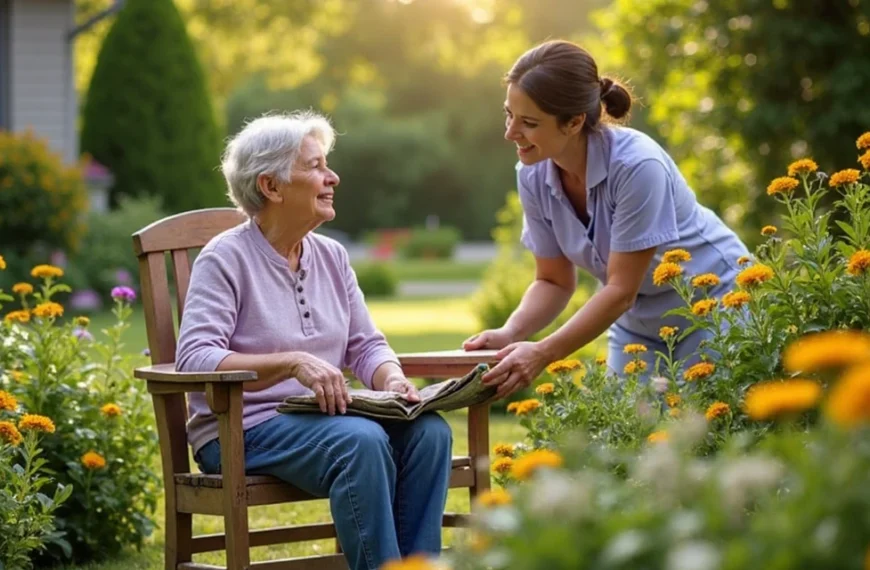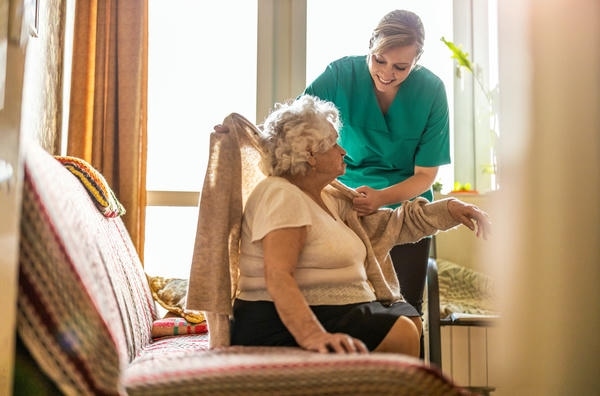A Caregiver’s Journey: Sarah and Grandma Rose
Once upon a time, in a serene neighborhood nestled among towering oak trees, Sarah and her beloved grandmother, Grandma Rose, shared a home filled with warmth and wisdom. Grandma Rose, known for her unwavering kindness and sage advice, was the heart of their family. As the years passed, Grandma Rose’s health began to decline. Deeply devoted to her grandmother, Sarah took on the role of caregiver with unwavering dedication. She ensured Grandma Rose received the best care possible, from daily medications to comforting companionship.
Amidst her caregiving journey, Sarah encountered a labyrinth of legal considerations that both intrigued and challenged her. She understood that beyond tender care, there were legal matters crucial to safeguarding Grandma Rose’s well-being and honoring her wishes. Sarah’s story serves as a poignant reminder of the legal complexities caregivers navigate while providing compassionate care to their loved ones.
Embracing Powers of Attorney: A Journey of Trust and Responsibility
One crisp autumn morning, Sarah sat with Grandma Rose, discussing the importance of legal documents like powers of attorney (POA). “Sarah,” Grandma Rose said softly, “having you as my financial power of attorney gives me peace of mind. Knowing you’ll manage my affairs ensures I can focus on what truly matters—cherishing our time together.” Sarah’s heart swelled with gratitude. Holding Grandma Rose’s trust felt like holding a precious heirloom.
With the financial POA in place, Sarah meticulously managed Grandma Rose’s finances, ensuring bills were paid promptly and investments were secure. Each decision made was a testament to their bond and Sarah’s commitment to protecting her grandmother’s legacy. Moreover, as the seasons changed, Sarah navigated new responsibilities with grace. Transitioning from managing day-to-day finances to making critical healthcare decisions required a deep understanding of Grandma Rose’s wishes and values.
As caregivers like Sarah step into the role of power of attorney, it’s essential to approach the responsibility with diligence and empathy. A financial POA grants the authority to manage the care recipient’s financial affairs, including paying bills, managing investments, and making financial decisions on their behalf. It’s a role that demands meticulous record-keeping, transparency, and a commitment to acting in the care recipient’s best interests.
Similarly, a medical power of attorney (MPOA) empowers the caregiver to make healthcare decisions when the care recipient is unable to do so themselves. With the MPOA firmly in place, Sarah advocated for Grandma Rose’s preferences during medical consultations. She ensured that treatments respected Grandma Rose’s dignity and comfort, fostering open communication that honored her grandmother’s autonomy.
Caregivers must approach these roles with a deep understanding of the care recipient’s wishes and values. Engaging in candid conversations about healthcare preferences, end-of-life care, and financial goals is crucial. By documenting these discussions and formalizing them through legal documents, caregivers can ensure that their loved one’s autonomy is respected even when they can no longer make decisions for themselves.
The Complexity of Probate: Honoring Grandma Rose’s Legacy
Spring brought unexpected challenges as Grandma Rose peacefully passed away, leaving behind cherished memories and an estate to be settled through probate. Sarah, though grieving, embraced her role in navigating this legal process with reverence. Probate, she learned, was a journey through paperwork and legal intricacies. Sarah meticulously gathered documents, sought guidance from an estate attorney, and ensured every detail aligned with state regulations.
Through dedication and perseverance, she honored Grandma Rose’s wishes, ensuring assets were distributed according to her will with transparency and respect. Moreover, as Sarah immersed herself in the probate process, she realized the importance of thorough record-keeping. Detailed documentation not only facilitated the settlement of Grandma Rose’s estate but also provided a clear narrative of their journey together. It was a testament to their enduring bond and Sarah’s commitment to preserving her grandmother’s legacy with meticulous care.
For caregivers navigating the probate process, seeking the guidance of an estate attorney is invaluable. Probate laws vary by state, and an experienced attorney can provide clarity on the specific requirements and procedures. Caregivers must gather essential documents, including the will, death certificate, and financial records, to facilitate the process.
Meticulous record-keeping is paramount during probate. Caregivers should maintain detailed accounts of all financial transactions, asset distributions, and communications with beneficiaries. This transparency not only ensures compliance with legal requirements but also fosters trust among family members during a potentially emotional time.
Guardianship and Conservatorship: Upholding Family Values
Amidst the legal landscape, Sarah encountered the responsibilities of guardianship and conservatorship—a path illuminated by family values and protective instincts. Reflecting on Grandma Rose’s unwavering care, Sarah understood the gravity of assuming these roles for an incapacitated loved one. As a guardian, Sarah made decisions that prioritized Grandma Rose’s well-being, from healthcare choices to daily living arrangements.
With conservatorship, she managed financial matters with meticulous care, ensuring Grandma Rose’s resources were safeguarded and used thoughtfully. Each decision made was a testament to Sarah’s commitment to honoring her grandmother’s legacy and protecting her best interests. For caregivers considering guardianship or conservatorship, it’s essential to understand the legal implications and responsibilities involved. Guardianship grants the caregiver authority to make personal and healthcare decisions on behalf of an incapacitated individual, while conservatorship focuses on managing their financial affairs.
Pursuing guardianship or conservatorship requires navigating a complex legal process. Caregivers must demonstrate the necessity of these arrangements and provide evidence of the care recipient’s incapacity. Working closely with an attorney specializing in elder law can help caregivers understand the requirements and prepare a compelling case.
Once appointed, guardians and conservators have a fiduciary duty to act in the best interests of the care recipient. This involves making decisions that prioritize their well-being, maintain their dignity, and align with their previously expressed wishes. Meticulous record-keeping, regular reporting to the court, and transparent communication with family members are essential to fulfilling these roles effectively.
Legal Protection in Family Conflicts
In cases of family conflicts, caregivers like Sarah can take proactive legal steps to protect themselves and uphold their responsibilities. Clear and open communication with all family members involved is essential. Documenting all discussions and agreements helps clarify expectations and prevents misunderstandings. In particularly contentious situations, involving a neutral third party, such as a mediator or family therapist, can facilitate constructive dialogue and help find mutually agreeable solutions.
Consulting with an attorney experienced in elder law can provide caregivers with invaluable guidance. Understanding and asserting legal rights and responsibilities ensures that caregivers like Sarah can navigate conflicts confidently and effectively. Creating legal documents such as powers of attorney, living wills, and guardianship designations not only formalizes the caregiver’s role but also ensures that their decisions are legally recognized and respected, even in challenging familial circumstances.
Compliance with Privacy Laws
Caregivers must prioritize privacy and comply with relevant laws when handling a care recipient’s personal information. This includes keeping medical records, financial documents, and other sensitive information secure and accessible only to authorized individuals. Familiarizing oneself with laws such as the Health Insurance Portability and Accountability Act (HIPAA) is crucial.
Caregivers should obtain proper legal consent forms to access and share a care recipient’s medical information, ensuring both privacy and compliance. Implementing secure storage systems, both physical and digital, helps safeguard sensitive documents. Caregivers should also be mindful of discussing private matters in public spaces and limit the sharing of personal information to only those who have a legitimate need to know.
Ramifications of Independent Contractor Status
When caregivers are classified as independent contractors, it’s essential to understand the legal implications for both parties involved. As an independent contractor, the caregiver assumes responsibility for their taxes, insurance, and other work-related expenses. They may not be entitled to traditional employment benefits such as minimum wage, overtime pay, and workers’ compensation.
Caregivers should seek guidance from an attorney or tax professional to fully grasp legal rights and obligations under this classification. Maintaining a clear agreement and contract that outlines the terms and expectations of the caregiving services is critical. This clarity helps prevent misunderstandings and ensures that both parties adhere to legal requirements.
A Legacy of Love and Legal Preparedness
As Sarah reflects on her journey as a caregiver, she realizes that navigating the legal landscape was an integral part of honoring Grandma Rose’s legacy. By embracing powers of attorney, meticulously managing probate, and upholding guardianship and conservatorship duties, Sarah embodied the values of love, responsibility, and respect that Grandma Rose instilled in her.
Grandma Rose’s story serves as a reminder to caregivers everywhere that legal preparedness is an act of love. By taking proactive steps to understand and address legal considerations, caregivers can ensure that their loved ones’ wishes are respected, their assets are protected, and their dignity is preserved. It is a journey that requires compassion, diligence, and a commitment to upholding the sacred bond between caregiver and care recipient.
In the end, Sarah’s journey as a caregiver was not just about navigating legal complexities; it was about celebrating the enduring love and wisdom that Grandma Rose had gifted her. Through every legal document signed and every decision made, Sarah carried the essence of Grandma Rose’s spirit—a legacy of love, resilience, and the unwavering belief in the power of family. And as Sarah continues to walk the path of a caregiver, she does so with the knowledge that her legal preparedness is a testament to the love that will forever guide her way.





